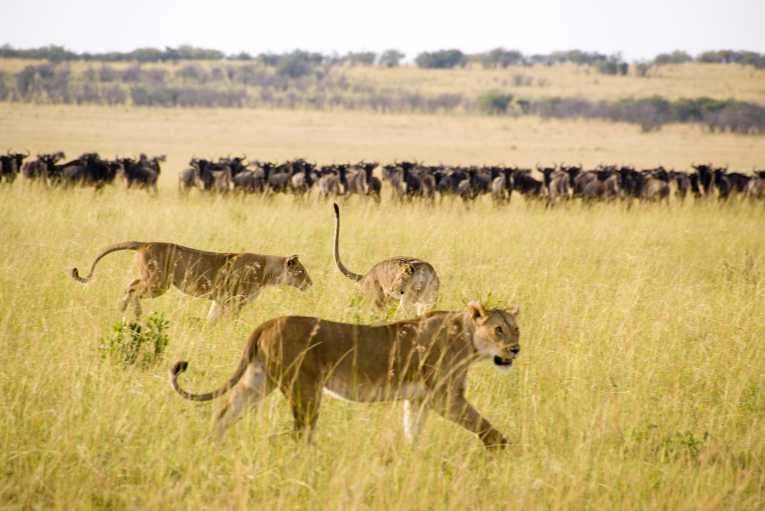What's the most threatening swipe to take at a vulnerable ecological pyramid - knocking a few blocks off the of the top? Or pulling away bricks from the bottom? Intuition would say the latter. And that's the way many ecologists and conservationists have tended to see changes progressing through ecosystems - working their way up from the lowest levels of the food chain, to potentially topple those at the top.
But a new paper, out in Science today, presents a strong case for considering the other way that threats can roll in ecosystems - top down. This is called 'trophic downgrading', and it happens when the big consumers and predators - such as lions, tigers, elephants, whales and bison, found at the top of the ecological pyramid - are weakened. And it seems that this weakening can produce significant, unpredictable and perverse effects on the other creatures and landscapes that make up such systems.
For changes happening at the bottom of the pyramid, it is relatively easy to visualize how 'apex consumers' at the top will find their perch a little less secure. And that bottom-up viewpoint has long dominated thinking about threats to ecosystems.
But in this new paper, a 24-strong team of scientists - led by James Estes from the Department of Ecology and Evolutionary Biology at the University of California - has pulled together a number of studies of ecosystems that show striking change; all because of hard knocks to their apex consumers. Such changes can reshape the nature of the ecosystem, which can then spill into negative consequences for man. Examples quoted include:
Much-reduced numbers of lions and leopards in many parts of Africa giving baboons a new lease of life. As baboon numbers increased, they took to raiding human crops. That increased contact with humans, and pushed up local people's rates of parasite infection, picked up from the baboons.
Severe losses amongst whale population, down to a century of whaling, removing one of the most important sculptors of the ocean's ecosystem. Whales bring nutrients up from from the dark depths of the oceans; their feces then help to support plankton near the surface, which support a greater abundance of fish. The loss of whales may actually have helped to push fish numbers down.
In both Australia and the north-eastern US, the sudden extinction of the massive mega-fauna roaming the plains at the end of the ice age led to grassland being swamped with brush. That caused an increase in fuel for wildfires, which swept these areas with greater frequency.
These cases are well-known to ecologists and conservationists - but have tended to be looked at as odd outliers in describing how ecological change happens. Dr Estes sees the new study as adding weight to a re-assessment of that view.
'By looking at ecosystems primarily from the bottom up, scientists and resource managers have been focusing on only half of a very complex equation,' he said. 'These findings demonstrate that top consumers in the food web are enormous influencers of the structure, function, and biodiversity of most natural ecosystems.'
The advance of ecosystems which have been reshaped in this way, or 'trophically downgraded', is not necessarily a modern problem. 'Large apex consumers have already been lost or depleted across most global ecosystems and so much of the world has already been 'trophically downgraded', Dr Estes confirmed.
But there may be hope. Reversing many of these losses is still within conservationists grasp. Dr. Estes believes that while some ecosystems have crashed beyond the point of repair, 'upgrades' to ecosystems may still be possible. 'In many cases I believe that the repatriation of large apex consumers will have a high likelihood of restoring ecological function,' he said.
And this work may help to resolve the debate about whether conservationists are too focused on the charismatic and photogenic super-stars of the animal world. It turns out that saving the 'poster children' may actually be key to saving the ecosystem they sit astride.
'I think our ideas help to clarify this by pointing out that what is good for many of these large, charismatic species is also good for biodiversity specifically and ecosystem health more generally,' said Dr Estes. 'Conservation efforts that ignore the influences of large apex consumers are bound to fail, or at least are bound to achieve less than might otherwise be the case.'
Top Image Credit: © Jason Tamplin















